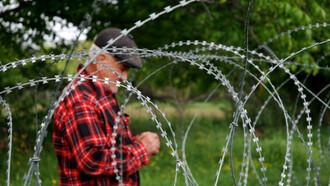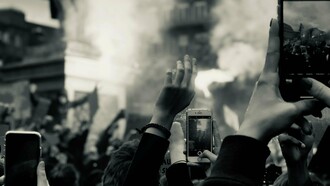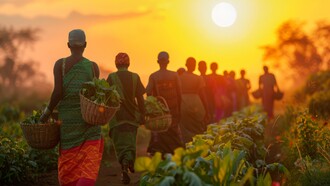My second year at the University of Virginia (UVA) ended abruptly with the arrival of COVID—a life-altering force that reshaped everything, leveling the emotional playing field for us all.
When the pandemic pushed us into a virtual existence, I tried to embrace the sudden change. After all, we were living through unprecedented times. But deep down, I was terrified. As the first few months of isolation wore on, the reality of our new, socially distanced lives began to sink in. And I started to realize just how much the pandemic had stripped away.
College, which had once seemed like this magical world full of possibility, was now demystified. The quality of my education began to deteriorate, and I finally understood the deep value of in-person connection—the small, spontaneous moments with friends, the learning that happens face-to-face, and the countless adventures we could take on a whim. It’s true what they say: you don’t realize what you have until it’s gone.
At one point, I considered taking a year off to recalibrate, to find a way to enjoy college again. But my friends were all sticking it out, and I decided to stay on track to graduate with them. It wasn’t an easy decision, and I questioned it repeatedly. That fall, we were allowed back on Grounds (campus), but all our classes remained virtual. Weekly COVID testing became a new ritual, with us lined up in a parking garage outside the university bookstore, 10 feet apart, spitting awkwardly into tubes.
The first semester of my third year felt like a never-ending cycle of monotony and isolation. I spent most of my time alone in my apartment, attending virtual classes and taking frequent walks to clear my head. Without access to university facilities or public spaces, there was little to break up the endless hours of work.
Looking back, I’m still baffled by the decision to offer an in-person “experience” that year. Maybe it was driven by financial motives, but the whole thing felt pointless. The regret over my choice to stay was palpable. UVA, like many universities, struggled with compliance. I had hoped that our student body would act responsibly, but instead, I witnessed the complete disregard of public health guidelines by some student organizations. Walking by fraternity houses on my evening walks, I could see the signs of underground parties—windows blacked out, music thumping inside. It was disheartening, to say the least.
I reported these incidents as part of an online system meant to hold people accountable. Time and again, I submitted reports, hoping that if we were “all in this together,” as everyone said, we would all follow the rules.
The pandemic had shattered the illusion of selfishness that college often indulges. It was no longer about reckless fun and personal freedom—there were lives at stake. That’s a concept many couldn’t seem to grasp.
Despite everything, I did manage to get closer to my small group of friends. We were crammed into tiny apartments, forced to coexist out of necessity. My own small saving grace was rowing. After months of recovery from surgeries, I’d been recruited in the winter before the pandemic, but COVID had canceled any plans to start. Still, I spent my mornings learning to row on an erg with my friend Laura. It was the one thing that felt like progress—something new to focus on, a skill to develop. Though we couldn’t join the team due to safety restrictions, the training kept me grounded through the chaos.
The semester ended, and though I was relieved, the passage of time had felt excruciatingly slow. But there was a glimmer of hope—President Biden’s election and the rollout of vaccines gave me something to look forward to.
The second semester felt like a repetition of the first, though I did have one class that met in person. Environmental Studies in the basement of the library—masks on, windows cracked open in the freezing cold—was my highlight. For that hour each week, I could interact with other students and, for the first time in months, feel somewhat normal. Slowly, UVA began to open up again. I seized every opportunity to use public spaces, and with each small shift, I felt a little bit more alive. Those moments of relief became my anchor, keeping me going while I waited for the world to heal.
In March, the vaccines became available. I rushed to get my friends and family vaccinated, including a trip to Danville to take a group of friends to CVS. After receiving the shot, I cried—not out of pain, but out of sheer relief. For the first time in over a year, I wasn’t terrified of the virus. I’ll always associate that moment with the release of SZA’s “Good Days.” As we drove back, the song playing in the background, I felt the weight of the past year lifting. Life was slowly returning, and I could see it, feel it, more clearly than ever.
By spring, the world was gradually opening again, and I saw the season for the first time with fresh eyes. It had been a long, cold winter, and now the warmth was returning. Still, my third year wasn’t without its scars. The mental toll of the pandemic had left its mark on everyone, and I learned of a friend’s tragic suicide at the end of the year. It devastated me. Even as the world began to reopen, the emotional cost of isolation was undeniable.
Despite the pain, there was a quiet sense of gratitude as I approached the end of my third year. It had been exhausting, but I had weathered the storm. I appreciated everything I had, the college experiences I still had a chance to enjoy, even as I mourned the experiences I had lost.
I hugged my friends goodbye for the summer, packed up my apartment, and prepared for the final stretch. The world was slowly coming back to life, and so was I.















